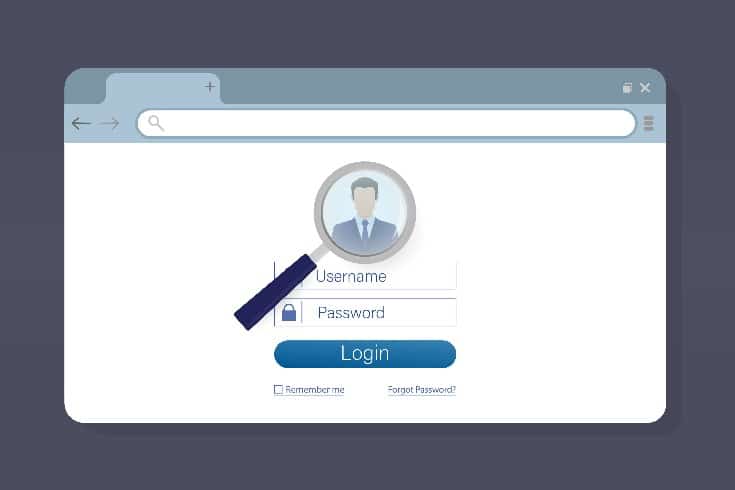How to Remove Negative Reviews on Japanese Retty

Have you ever found yourself struggling to choose a restaurant when planning a meal out? In such situations, many people turn to the internet or apps to gather information and reviews about potential dining options. Retty is one of the most popular web services and apps used for restaurant selection and reservation. It features a wide range of reviews and information about various eateries, making it an indispensable tool for attracting customers to a restaurant. However, due to its significant influence, the damage can be substantial if negative reviews are posted. In this article, we will discuss how to manage reputational damage in the event of defamatory reviews being posted on Retty.
Explanation about Retty
Retty is a restaurant and dining review site operated by Retty Inc. since June 2011. Here, you can search for restaurants based on various criteria, make reservations for your favorite places, and register them on your “want to go” list. You can also leave reviews about the restaurants you’ve visited.
The most distinctive feature is its real-name registration system. Membership registration can only be done through real-name SNS such as Facebook and LINE. Real-name registration is mandatory, and you cannot register with a pen name or pseudonym. Because it is done in real name, it may be viewed by acquaintances, and there are fewer prank posts or negative posts, and it is personalityized by many positive posts that recommend to others.
Retty aims to provide a service that makes both the restaurant and the user happy. In fact, unlike many other review sites, Retty does not have a system to score and rate restaurants or display average scores. Instead of a conventional service that suggests restaurants from rankings calculated based on review ratings, it is a service that suggests recommended restaurants from trusted friends and people with similar tastes, and in this respect, it is more of a restaurant-specific SNS than a review site. The number of users has been increasing rapidly in recent years, and it can be said that it will become an increasingly influential service in the future.
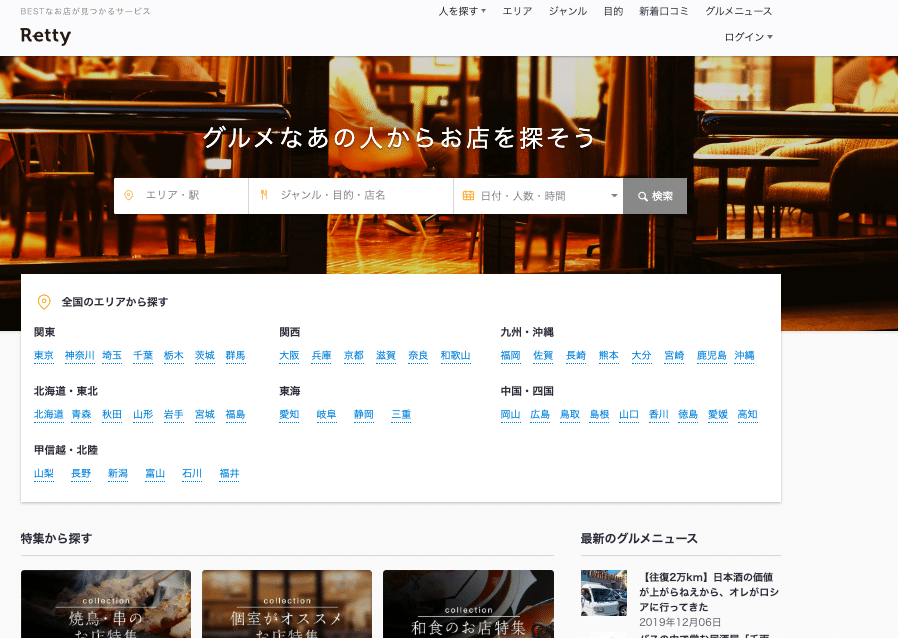
What are the Negative Reviews Posted on Retty?

Retty is a service that aims to introduce “recommended restaurants”, so the posts are generally positive. The fact that it operates on a real-name registration system seems to support this. However, as it is a review site, negative reviews can also be posted. In this article, we will explain the content of negative reviews and potential reputational damage that can be expected in the review section of Retty.
Reviews Expressing Excessive Dissatisfaction
The first type of review to consider is one that criticizes the restaurant. A review like “I ordered the steak that they claim is the most popular, but the meat was tough and hard to chew. Honestly, I can’t recommend it” can be considered unfavorable for the restaurant. However, such reviews based on the customer’s subjective evaluation are hard to classify as defamation, and as they are one form of opinion, it is not immediately possible to label them as malicious. It becomes difficult to judge whether such reviews should be removed. However, depending on the case, reviews that include definitive expressions like “You should absolutely not go to this restaurant” or “The worst dinner”, contain defamatory expressions, or state things contrary to fact, may be subject to removal. Also, content that is not based on the actual dining experience, such as “The meat was served, but it looked unappetizing and seemed like it would upset my stomach, so I left without eating it”, may also be subject to removal.
Posts Regarding Personal Disputes
Next, there are reviews that describe personal disputes between the restaurant and the user. For example, “I reserved a window seat, but was seated farthest from the window”, “I was charged more than the amount I ordered”, or “There was a hair in my food”. Descriptions of such troubles are difficult to verify in terms of facts, and it is desirable for the parties involved to resolve them. Furthermore, they can be considered negative as they lower the restaurant’s image and reputation. As they are far removed from the introduction of recommended restaurants, they may be subject to removal by Retty.
Reviews Containing Defamation or Malicious Expressions Against Individuals
Other possible reviews include those containing malicious expressions or descriptions of defamation. For example, consider reviews like “Manager A harasses me every time”, “Waitress B tricked me out of money”, or “Staff C is unhygienic”. Such expressions, which defame specific individuals such as Mr. A, Ms. B, and Mr. C, as well as the restaurant’s reputation, should be removed promptly. Even if the accusations of harassment or violations of laws and regulations are true, it is difficult to verify the facts through reviews, and the content should be reported to the appropriate authorities or police. For those who may suffer damage such as defamation due to such posts, it is desirable to have them removed as soon as possible.
How to Request Removal for Violation of Terms of Use
Retty Posting Guidelines and Terms of Use
Retty has posting guidelines that outline examples of posts that could be subject to removal and the basic policies of Retty’s management. The terms of use for Retty also list prohibitions regarding posts. Posts that violate these guidelines and terms of use can be considered for removal, and there is a possibility they will be removed if reported through the contact form.
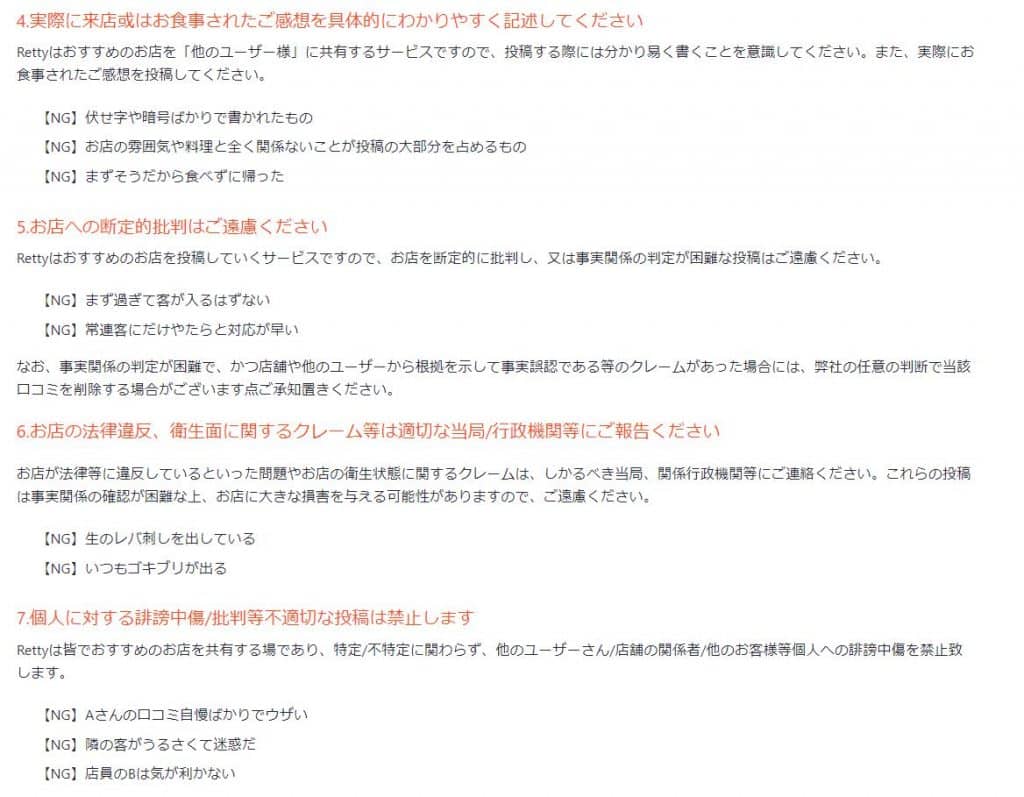
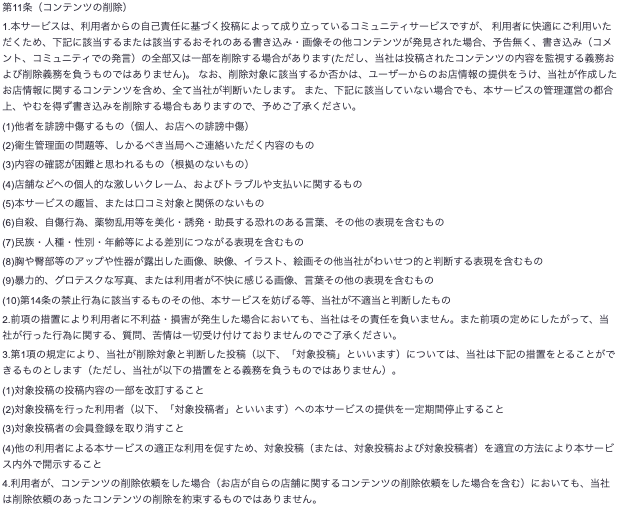
How to Request Removal
In Retty, you can use a simple reporting feature from the iPhone app. The report is a simple process of pressing the report button, and it seems that the management will consider the reported review based on the terms of use and posting guidelines.
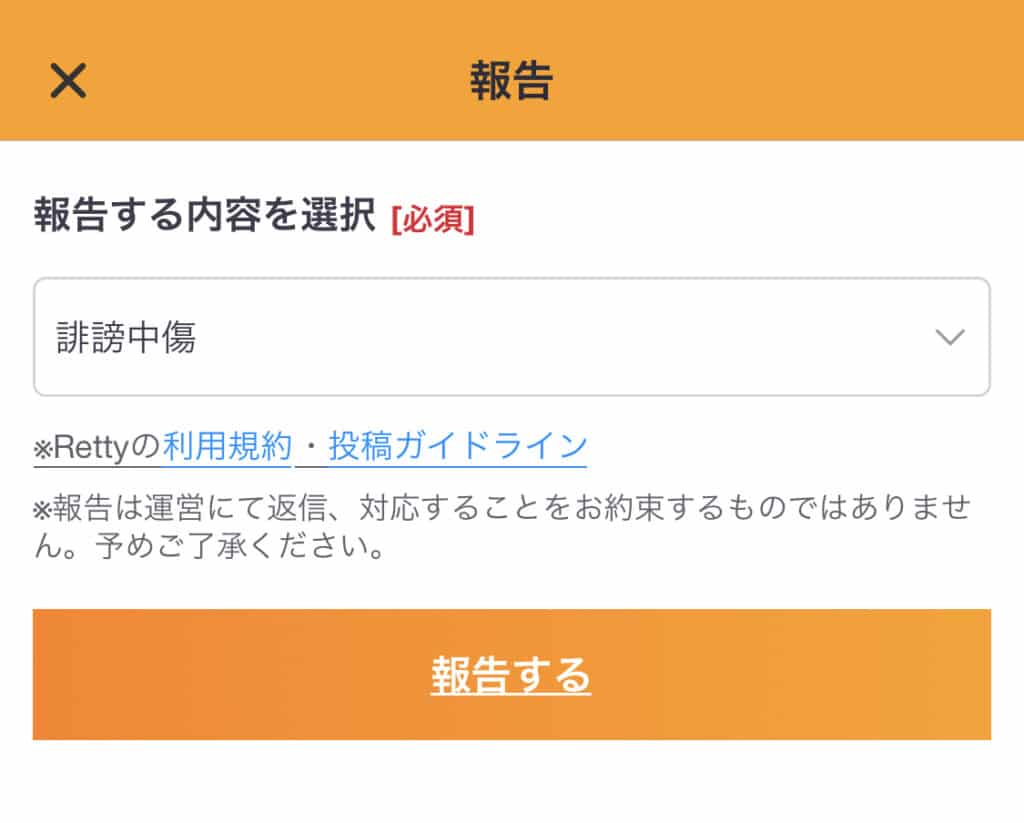
However, since the reporting feature does not have a field for entering text, you cannot express in your own words why you want the post to be removed. If you want to convey a specific reason for requesting removal, it is better to do so from the contact form. When you search for Retty’s contact form, the contact email address will be displayed. If you send an email here, it seems that you will receive a reply by the next business day.
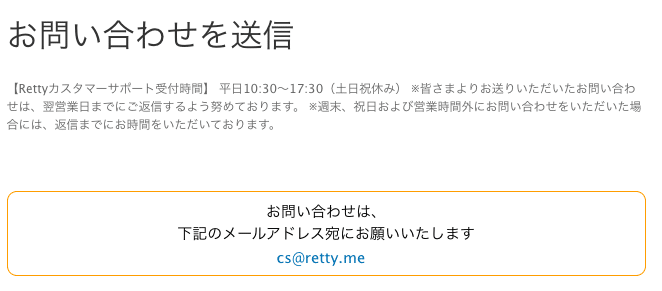
Examples of When to Request Removal for Violation of Terms of Use
Since Retty’s contact is via an email form, first, make sure to write a concise subject like “Request for Review Removal” so it’s easy to understand. Also, to make it easier for Retty to identify which review you’re referring to, it’s important to attach the URL or a screenshot. For example, let’s say there’s a review that says, “The meat was brought out, but it looked unappetizing, and I left without taking a bite because it looked like it would upset my stomach.” You could write the description field as follows: “Thank you for your time. I am A, the manager of French Restaurant XX. I would like to request the removal of a review about our restaurant. The URL is https://retty.me/ABCD1234…, and the review is by Mr./Ms. Koda Otoko, as shown in the attached screenshot. This review states that the meat looked unappetizing and the reviewer left without taking a bite. While it’s unfortunate if someone actually ate our food and didn’t find it tasty, it’s not acceptable to say it looked unappetizing without even trying it, and it could harm our restaurant’s image. Moreover, we haven’t had any customers who ordered meat and left without eating a bite in the past three months, so we question whether this person actually visited our restaurant. This review falls under the NG examples in Retty’s Posting Guidelines 4. Such posts negatively affect our business, so we would like to request its removal. Thank you for your understanding.”
If your removal request is not honored and the post is not removed, you can consider taking legal action against Retty, such as requesting a send prevention measure or considering filing a lawsuit. These are legal matters, so you will need to handle them yourself or consult with a lawyer. Be careful when entrusting the removal to a removal agency other than a lawyer, as it could potentially violate the law.
When Requesting Removal on the Grounds of Illegality

Legal Measures Available
If the content infringes on rights or violates the law, it is possible to dispute the removal through a lawyer in court. The legal measures that can be taken in relation to online reputation damage control can be broadly divided into:
- Request for voluntary deletion through a transmission prevention measure request
- Request for deletion of posted articles and application for provisional disposition
- Request for disclosure of sender information (request for disclosure of IP address, request for disclosure of name and address)
- Claim for damages (claim for damages after identifying the poster)
Among these, the requests directly related to deletion are the transmission prevention measure request, the request for deletion of posted articles, and the application for provisional disposition.
What to Claim Legally
When making a request for deletion under the law, the first thing to consider is to claim ‘defamation’. Defamation is established when all of the following are applicable:
- ‘Publicly’
- ‘Indicating a fact’
- ‘Defaming a person’s reputation’
For example, if a review is posted saying, “If you get friendly with Manager A, he’ll serve you raw liver, which should be banned, as a secret menu!” let’s look specifically at whether it meets the requirements 1 to 3. First, posts on review sites like Retty, as in this case, can be said to be ‘publicly’ placed in a state where an unspecified number of people can view them on the Internet. Next, ‘indicating a fact’ means stating a concrete fact that is sufficient to lower a person’s social evaluation, regardless of whether it is true or false. In this case, the content is ‘providing raw liver’, and such content indicates a fact that Manager A is engaging in an act that violates the Food Sanitation Law by providing raw liver, which is sufficient to lower the social evaluation of the manager and the restaurant.
Finally, to ‘defame’, it is sufficient if there is an abstract risk of harm to social evaluation, and it is not necessary for the reputation to be actually infringed. It is not necessary to prove that the post in question was viewed by an unspecified number of people on Internet news and SNS, and that criticism and protests flooded the salon. It is enough to say that there is an objective risk. Please refer to the following article for detailed explanation of the requirements for defamation.
https://monolith.law/reputation/defamation[ja]
Removal through the Court Process (Provisional Disposition)
When seeking removal due to legal violations such as defamation, the usual first step is to request a transmission prevention measure. However, this is a method of requesting removal without going through the courts, asking for voluntary removal by Retty. As it is a discretionary measure, depending on the judgement, removal may not be carried out. In contrast, in the court process, if removal is approved in court, a binding force arises from the judgement, and Retty will be compelled to comply with the removal. Therefore, if a transmission prevention measure is not approved, it is effective to transition to the court process.
Provisional disposition is a method stipulated in the Japanese Civil Preservation Law (民事保全法), and is used when an immediate resolution is required, to seek temporary measures before obtaining a final judgement through a formal lawsuit. In cases like this, where there is a high risk of irreparable damage once defamatory reviews spread, it is effective to use the provisional disposition system to seek immediate removal of information, in conjunction with filing a lawsuit. Once a provisional disposition order is issued, the court orders the other party to remove the post, and the other party will comply with the removal. In the case of provisional disposition, consulting with a lawyer who has expertise in reputational damage measures can often result in removal within 2-3 months from the request, making it an effective measure. For detailed explanations about the removal of articles in cases of defamation or reputational damage, and the procedure for provisional disposition, please refer to the article below.
https://monolith.law/reputation/provisional-disposition[ja]
Identification of Posters through Provisional Dispositions
If you seek the assistance of a lawyer for the identification of posters through provisional dispositions, it is possible to disclose information such as the poster’s IP address through a so-called sender information disclosure request, potentially identifying the poster. By doing this, you can demand compensation for damages suffered due to defamatory posts from the identified sender. The flow of these procedures is explained in detail in the article below.
https://monolith.law/reputation/disclosure-of-the-senders-information[ja]
Summary
Retty is a site that requires real-name registration and focuses on recommending restaurants, making it a platform with few malicious posts. It is likely to be user-friendly for businesses. However, as it is a review site where users can freely post, there is a possibility of posts leading to disputes or negative comments. Nevertheless, you may be able to resolve these issues by requesting deletion or taking legal measures as mentioned above, even if your deletion request is not accepted. The method and argument you should use, and whether deletion will be granted, varies depending on the individual case. In any case, asserting illegality involves specialized content and methods, making it difficult for individuals to handle, and it also involves legal actions, so you will need the help of a lawyer. First, consult with a lawyer to determine whether the review in question infringes on your rights or violates the law.
Category: Internet






